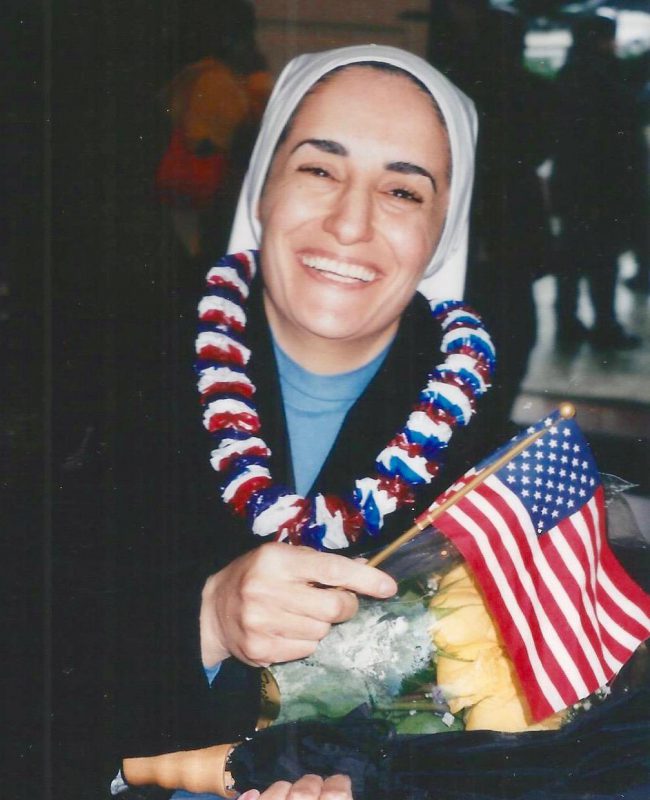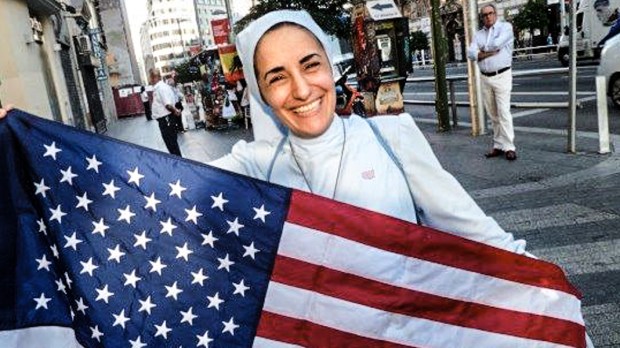Lenten Campaign 2025
This content is free of charge, as are all our articles.
Support us with a donation that is tax-deductible and enable us to continue to reach millions of readers.
In 2007 when I discerned to become an American citizen (an opportunity I had since I am a religious sister and thus qualify for an R-1 visa), there were many things that I loved and admired about our country and our American nation. The day that I took the oath of citizenship I told many people that I chose this very important step not to live in America but to be an American and look at every American as my family. One of the memorable meditations that I had on that day was the beautiful name of our country: The United States of America. I was particularly struck by the word “United” and very excited to be a part of a family that has unity as its foundation, celebrating that we are people of many States, called into peaceful unity as Americans.
Unity is like a bridge, built to connect two points. Bridges are direct and they shorten distances yet it takes much time, effort, and patience to build a bridge. Most importantly, it takes willingness on the part of everyone, from each side, to cooperate with one another in building the bridge that connects them.
As I studied the history of our nation, I learned that not only our county has been blessed with many amazing bridges in most of the States, but also with remarkable men and women who spent their lives (and sometimes sacrificed them) in order to build bridges between Americans, despite political parties, or the color of their skin, or their religious beliefs.
Yet, on August 12, white supremacists and neo-Nazis demonstrated in Charlottesville, Virginia that more work must be done. It is heartbreaking to see my American family today divided instead, forgetting the beautiful “unity” in our nation’s name. It is heartbreaking, too, to see the right to free expression — such a beautiful gift and blessing — used, as it was in Charlottesville, to express such confusion about our shared humanity, and what true freedom means in our society.
Cardinal Sean O’Malley, Archbishop of Boston, in his statement in the wake of the white nationalist rally in Charlottesville, VA said: “Our country is once again in a moment when the civic and biblical heritage is being attacked and tested. We need to reassert and reaffirm the belief that one nation is meant to include all: the multiple races, cultures, ethnicities and religions which make up our country.”
As we reflect on the current events of such division, anger (and, at times, even hate and malice in our American family), we cannot lose hope or be discouraged, because the good that we have and the admirable history that we treasure is much bigger and much greater. Our American family is a makeup of many children who call this land their home regardless of the origin of their ethnicity, tradition of their faith, or their economic status. As we face these challenging times we have to be very diligent to focus on finding a response to such dark realities, and the festering wounds from which they have emerged, rather than simply react with violence, or by actions that threaten to diminish all of us, no matter how well-intentioned. We have to stop and look at each other — see each other as human beings, God-created and worth more than ideology. That is the only way we can begin to find suitable foundations upon which to build a new bridge.
It’s not what happens to us, but how we respond to it that matters. A reaction and a response may look exactly alike, but they are very different. A reaction is typically quick, without much thought, tense and aggressive. A response is thought-out, calm and non-threatening. A reaction typically provokes more reactions, perpetuating a long line of hatefulness with nothing accomplished.
A reaction causes destruction to our “bridges,” but a response can help to repair a damaged bridge or, if necessary, construct new ones where needed.
Today more than ever, there is a need for an open dialogue, conversation and understanding so that we can come together as one family to repent, to forgive and to heal. This is the path that leads to peace. The words of Albert Einstein confirm that, “Peace can only be achieved by understanding.” Saint Pope John Paul II went further: “No peace without justice; no justice without forgiveness.”
May the hearts of all people be open to the love that can heal and reconcile. Love is the road that leads to forgiveness, and forgiveness is the key that opens the door of peace. Martin Luther King Jr. reminds us that: “Love is the ultimate force that makes for the saving choice of life and good against the damning choice of death and evil. Therefore the first hope in our inventory must be the hope that love is going to have the last word.”
Bishop James Conley, bishop of the Diocese of Lincoln, recently affirmed the message of love by saying, “The only Christian response to the evil that unfolded in Charlottesville is to redouble our prayers for our nation, and to redouble our efforts to build a civilization of love.” So let love be our bridge.


